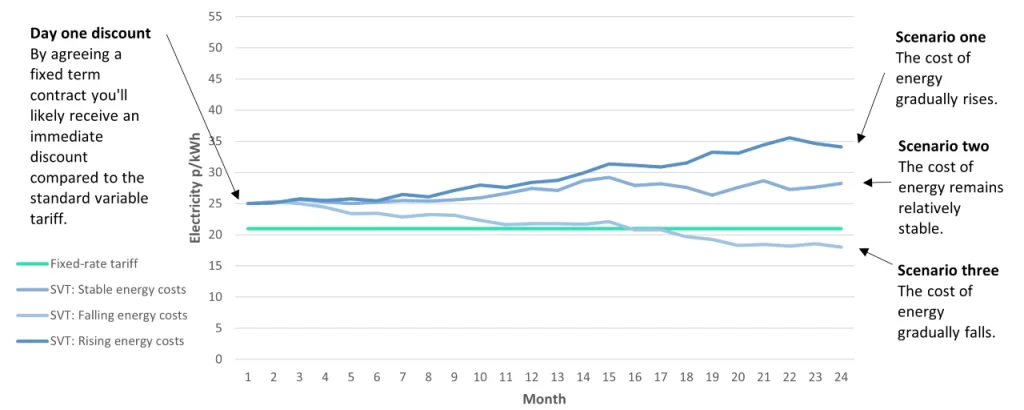Business energy tariffs
Compare Business Energy Tariffs and Save up to 45% Today
Just enter your business postcode…
Compare Business Energy Tariffs and Save up to 45% Today
Just enter your business postcode…
Choosing the right business energy tariff is essential for managing costs for your business. Businesses that don’t actively choose the right business energy tariff can pay enormously expensive out-of-contract business electricity prices. Shockingly, these out-of-contract rates can be over twice as expensive as fixed-rate tariffs on offer on the market.
The key decision for small business owners, when you compare business energy prices, is choosing between a fixed or variable tariff. Here are the key differences between these:
💡In large business energy, there are more tariff options – click for our full list.
Most SMEs in the UK choose a fixed busienss energy tariff for two reasons:
💡Here’s our full summary of the benefits of a fixed business energy tariff.
The downside of a fixed contract is that you will not benefit from falling wholesale energy prices during your tariff. Our graph below compares the unit price paid at a fixed rate versus the unit price paid in a variable business energy tariff in a few different scenarios.

Our experts have produced a full guide to help you decide whether to fix energy prices until 2025.
The overall price is obviously the main focus, but what else should you consider when choosing a business energy tariff:
For more information, here’s our guide on what happens at the end of a business energy contract.
Our business energy experts summarise the six most important benefits of a fixed-rate business energy tariff.

With a fixed-rate tariff, businesses can lock in a set price for their energy supply over a specific period, typically one to five years. This provides price stability and protects a company from potential energy price fluctuations, making monthly business energy bills predictable.

With a fixed-rate tariff, businesses can accurately forecast and manage their budgets for energy costs, improving their ability to manage and allocate funds. It’s particularly beneficial for small and medium-sized enterprises (SMEs) with limited resources and a need for cost certainty.

Various factors influence energy prices, including global demand, geopolitical events, and weather conditions. Businesses can shield themselves from these fluctuations by choosing a fixed-rate tariff which maintains stable energy costs regardless of market conditions.

Fixed-rate tariffs often involve signing a multi-year contract with an energy supplier. While this commitment may initially seem restrictive, long-term contracts provide stability, ensuring uninterrupted service and minimising the hassle of frequently switching suppliers.

Businesses with fixed-rate tariffs can easily compare energy prices and offerings between competing suppliers, allowing you to calculate the cheapest tariff. This empowers business owners to make informed decisions while evaluating the offerings of different suppliers.

Fixed-rate business energy contracts have very simple billing. Each month, your energy used (in kWh) will be multiplied by your agreed unit rate to calculate your usage charges. In contrast, your unit rates may increase or decrease monthly in a variable tariff.
Here, we answer the most common questions surrounding business energy tariffs. In this section, we explore everything you need to know to compare business energy tariffs.
A cooling-off period allows you to cancel the contract within a certain timeframe without penalty.
Unfortunately, business energy suppliers do not offer a “cooling-off period” as they have to buy your energy from the wholesale market in advance when you first sign a contract with them.
This means you must read your contract and ask any questions to ensure you understand and are happy with what you are signing.
Check out our complete guide to cooling off periods on business energy contracts.
Yes, you can get renewable business energy tariffs. Most business energy suppliers offer renewable tariffs for customers looking to reduce their carbon footprint.
The fuel mix of renewable business energy tariffs will only provide energy generated from inexhaustible sources. Renewable energy tariffs in Britain are typically powered by:
Typically, a company will have a separate business energy tariff for each energy supply point (MPAN/MPRN). However, for businesses with properties across the country, managing each separately can become a massive administrative burden.
The multi-site business energy meter solves this problem. A multi-site tariff is a single contract that encompasses several individual supply points. The quotation process for multi-site properties can be complicated and requires bespoke quotes from business energy suppliers.
Our business energy experts are here to help arrange a multi-site energy tariff. Simply enter the details of your head office in our business energy tariff comparison box above, selecting “multiple properties”. We’ll then work to collect multi-site tariff quotes for your business.
In 2023, a little-known business energy tariff became a popular option – the blend and extend tariff.
The blend and extend tariff is a mid-contract option where you’ll agree to extend the duration of your current fixed tariff while benefiting from a reduction in your fixed energy prices.
In the autumn of 2022, prices soared, and many businesses entered into fixed contracts, locking them into expensive rates. Since then, the cost of energy has fallen significantly. A blend and extend option allows these businesses to partially benefit from the falling prices.
For more information, here’s our article on getting out of a business energy contract.
A green business energy tariff is a tariff that is sourced from renewable energy sources, such as wind, solar, hydro, or biomass. Your energy supplier will also typically contribute to environmental schemes as part of the deal.
Green energy tariffs typically involve a slightly higher price than standard tariffs, as the cost of generating electricity from renewable sources is generally higher than from non-renewable sources such as fossil fuels.
For more information, check out our guide on renewable energy for business.
A business energy tariff is a contractual agreement between a business and an energy supplier. An energy tariff tells you how much you’ll pay per kWh used and how much your daily standing charge will be during your energy contract with your business energy supplier.
Here are the three most important components of a business energy tariff: